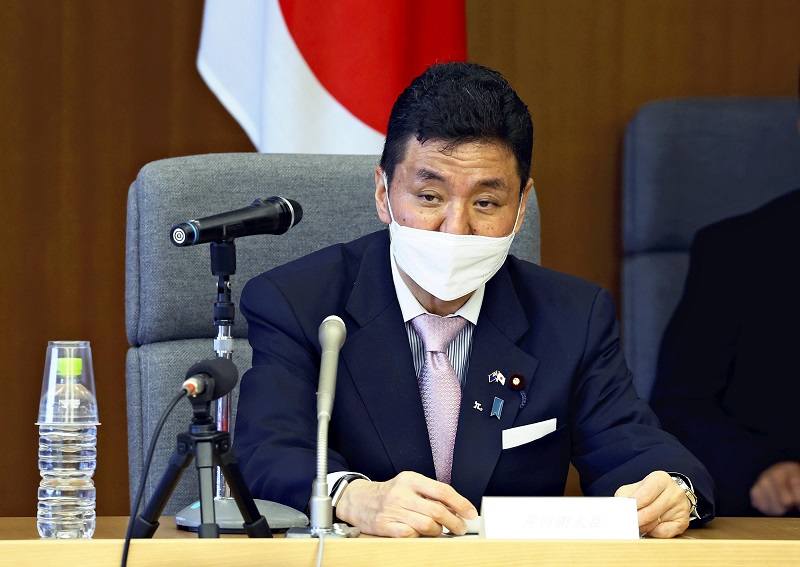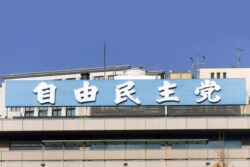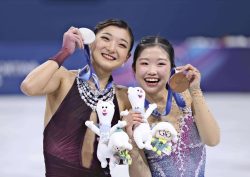Politicians of both ruling and opposition parties use Unification Church ties for election support

Defense Minister Nobuo Kishi speaks at a press conference in Tokyo in June.
6:00 JST, July 31, 2022
Various ways in which politicians have received election support from the religious group widely known as the Unification Church have come to light in the wake of the fatal shooting of former Prime Minister Shinzo Abe.
Some politicians are reviewing their ties to the group, which has engaged in activities that provoke concern in society, such as a “spiritual sales” method to cajole its followers into buying expensive items.
“I received various kinds of assistance from individual volunteers during election campaigning,” Defense Minister Nobuo Kishi said at a press conference on Friday, explaining his relationship with the group, which is now officially called the Family Federation for World Peace and Unification.
Kishi, Abe’s younger brother, said he had some volunteers linked to the group working for him to make phone calls to voters to ask for their support during the House of Representatives election campaign.
Kishi said he “thought at the time there was no problem,” but will “carefully examine whether that was the right thing to do.”
In 1968, Unification Church founder Sun Myung Moon (1920-2012) launched an anti-communist political organization called the International Federation for Victory over Communism. Since that time, the church is said to have built relationships with conservative politicians, mainly from the LDP, including former Prime Minister Nobusuke Kishi, the grandfather of Abe and Nobuo Kishi.
There are many LDP Diet members among the politicians whose relationships with the church have recently come to light.
Education, Culture, Sports, Science and Technology Minister Shinsuke Suematsu said that people linked to the group had bought tickets for his political fund-raising parties in 2020 and 2021. The tickets cost a total of ¥40,000.
In 2016, a political party chapter headed by Hakubun Shimomura, former education minister, also received a ¥60,000 donation from an organization affiliated with the group.
Opposition parties are no exception. Democratic Party for the People leader Yuichiro Tamaki received donations totaling ¥30,000 in 2016 from a former president of an organization affiliated with the group. Nippon Ishin no Kai (Japan Innovation Party) head Ichiro Matsui attended a meeting of an organization affiliated with the group about 20 years ago.
Congratulatory messages
Why have politicians built ties with the group? Many in the political world say it is for election purposes.
Yoshiyuki Inoue, an LDP member of the House of Councillors, became a “supporting member” of the group shortly before official campaigning kicked off for the upper house election in July, in which he was reelected.
It was reported that he became a supporting member because his campaign pledges were in line with the group’s concepts. One of his secretaries told The Yomiuri Shimbun that Inoue did so in order to receive support in the election.
Many politicians were also found to have sent congratulatory messages for events linked to the group.
“There are many organizations whose actual status remains unclear, but if you do nothing when asked to attend an event, you’ll make them your enemies in the election. That’s why I used to send congratulatory messages,” a former lower house member recalled, speaking to The Yomiuri Shimbun.
Local leaders have also received support from the group. Toyama Gov. Hachiro Nitta admitted that he had received support from the group in the 2020 gubernatorial election in which he was first elected.
“They took a grassroots approach in the election campaign, and I was grateful for that at the time,” said Nitta.
Meanwhile, the group is also believed to have taken advantage of its connections with politicians.
A former follower of the group said that he was repeatedly shown pictures of Moon shaking hands with politicians.
Since the 1980s, the group has used its spiritual sales method to cajole people into buying expensive goods, such as pots and personal seals, by telling them that they are cursed by their ancestors to fuel their anxiety. The group’s mass weddings in which total strangers are made into couples has also emerged as a social problem.
Even sending a congratulatory message to an event related to the group means “support” to it, and the group could use such gestures by politicians for publicity, according to Hokkaido University Prof. Yoshihide Sakurai.
“For voters, the support groups of each politician are important information in choosing who to vote for, so politicians should clearly indicate from which groups they receive support,” said the expert in the sociology of religion.
Top Articles in Politics
-

Japan PM Takaichi’s Cabinet Resigns en Masse
-

Sanae Takaichi Elected 105th Prime Minister of Japan; Keeps All Cabinet Appointees from Previous Term
-

Japan’s Govt to Submit Road Map for Growth Strategy in March, PM Takaichi to Announce in Upcoming Policy Speech
-

LDP Wins Historic Landslide Victory
-

LDP Wins Landslide Victory, Secures Single-party Majority; Ruling Coalition with JIP Poised to Secure Over 300 seats (UPDATE 1)
JN ACCESS RANKING
-

Japan PM Takaichi’s Cabinet Resigns en Masse
-

Japan Institute to Use Domestic Commercial Optical Lattice Clock to Set Japan Standard Time
-

Israeli Ambassador to Japan Speaks about Japan’s Role in the Reconstruction of Gaza
-

Man Infected with Measles Reportedly Dined at Restaurant in Tokyo Station
-

Man Infected with Measles May Have Come in Contact with Many People in Tokyo, Went to Store, Restaurant Around When Symptoms Emerged





















